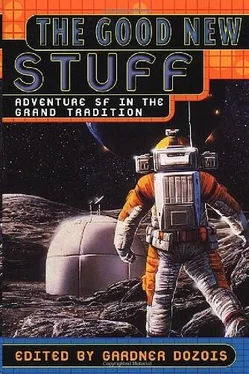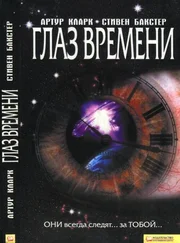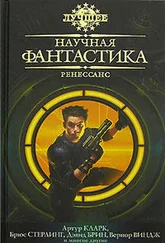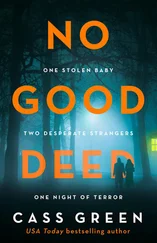Стивен Бакстер - The Good New Stuff
Здесь есть возможность читать онлайн «Стивен Бакстер - The Good New Stuff» весь текст электронной книги совершенно бесплатно (целиком полную версию без сокращений). В некоторых случаях можно слушать аудио, скачать через торрент в формате fb2 и присутствует краткое содержание. Год выпуска: 2002, ISBN: 2002, Издательство: St. Martin's Griffin, Жанр: Фантастика и фэнтези, на английском языке. Описание произведения, (предисловие) а так же отзывы посетителей доступны на портале библиотеки ЛибКат.
- Название:The Good New Stuff
- Автор:
- Издательство:St. Martin's Griffin
- Жанр:
- Год:2002
- ISBN:0-312-26456-9
- Рейтинг книги:3 / 5. Голосов: 1
-
Избранное:Добавить в избранное
- Отзывы:
-
Ваша оценка:
- 60
- 1
- 2
- 3
- 4
- 5
The Good New Stuff: краткое содержание, описание и аннотация
Предлагаем к чтению аннотацию, описание, краткое содержание или предисловие (зависит от того, что написал сам автор книги «The Good New Stuff»). Если вы не нашли необходимую информацию о книге — напишите в комментариях, мы постараемся отыскать её.
The Good New Stuff — читать онлайн бесплатно полную книгу (весь текст) целиком
Ниже представлен текст книги, разбитый по страницам. Система сохранения места последней прочитанной страницы, позволяет с удобством читать онлайн бесплатно книгу «The Good New Stuff», без необходимости каждый раз заново искать на чём Вы остановились. Поставьте закладку, и сможете в любой момент перейти на страницу, на которой закончили чтение.
Интервал:
Закладка:
Dawn. By now, sure…
Opera rose and stepped outside, then held a hand out to Pico. She took it with both of hers and said, "Thank you," while rising, looking past him and seeing the paddock and the familiar faces, the green ground and the giant tent with its doorways opened now, various birds flying inside and out again… and Pico most surprised by how little she was surprised, Opera still holding her hands, and his flesh dry, the hand perfectly calm.
The autodocs stood waiting for orders.
This time, Pico had been carried from the skimmer, riding cradled in a robot's arms. She had taken just a few faltering steps before half-crumbling. Exhaustion was to blame. Not fear. At least it didn't feel like fear, she told herself. Everyone told her to take it easy, to enjoy her comfort; and now, finding herself flanked by autodocs, her exhaustion worsened. She thought she might die before the cutting began, too tired now to pump her own blood or fire her neurons or even breathe.
Opera was standing nearby, almost smiling, his pleasure serene and chilly and without regrets.
He hadn't said a word since they left the skimmer.
Several others told her to sit, offering her a padded seat with built-in channels to catch any flowing blood. Pico took an uneasy step toward the seat, then paused and straightened her back, saying, "I'm thirsty," softly, her words sounding thoroughly parched.
"Pardon?" they asked.
"I want to drink… some water, please…?"
Faces turned, hunting for a cup and water.
It was Opera who said, "Will the pond do?" Then he came forward, extending an arm and telling everyone else, "It won't take long. Give us a moment, will you?"
Pico and Opera walked alone.
Last night's ducks were sleeping and lazily feeding. Pico looked at their metallic green heads, so lovely that she ached at seeing them, and she tried to miss nothing. She tried to concentrate so hard that time itself would compress, seconds turning to hours, and her life in that way prolonged.
Opera was speaking, asking her, "Do you want to hear why?"
She shook her head, not caring in the slightest.
"But you must be wondering why. I fool you into believing that I'm your ally, and I manipulate you—"
"Why?" she sputtered. "So tell me."
"Because," he allowed, "it helps the process. It helps your integration into us. I gave you a chance for doubts and helped you think you were fleeing, convinced you that you'd be free… and now you're angry and scared and intensely alive. It's that intensity that we want. It makes the neurological grafts take hold. It's a trick that we learned since the Kyber left Earth. Some compilations tried to escape, and when they were caught and finally incorporated along with their anger—"
"Except, I'm not angry," she lied, gazing at his self-satisfied grin.
"A nervous system in flux," he said. "I volunteered, by the way."
She thought of hitting him. Could she kill him somehow?
But instead, she turned and asked, "Why this way? Why not just let me slip away, then catch me at the spaceport?"
"You were going to drink," he reminded her. "Drink."
She knelt despite her hip's pain, knees sinking into the muddy bank and her lips pursing, taking in a long, warmish thread of muddy water, and then her face lifting, the water spilling across her chin and chest, and her mouth unable to close tight.
"Nothing angers," he said, "like the betrayal of someone you trust."
True enough, she thought. Suddenly she could see Tyson leaving her alone on the ocean floor, his private fears too much, and his answer being to kill himself while dressed up in apparent bravery. A kind of betrayal, wasn't that? To both of them, and it still hurt….
"Are you still thirsty?" asked Opera.
"Yes," she whispered.
"Then drink. Go on."
She knelt again, taking a bulging mouthful and swirling it with her tongue. Yet she couldn't make herself swallow, and after a moment, it began leaking out from her lips and down her front again. Making a mess, she realized. Muddy, warm, ugly water, and she couldn't remember how it felt to be thirsty. Such a little thing, and ordinary, and she couldn't remember it.
"Come on, then," said Opera.
She looked at him.
He took her arm and began lifting her, a small, smiling voice saying, "You've done very well, Pico. You have. The truth is that everyone is very proud of you."
She was on her feet again and walking, not sure when she had begun moving her legs. She wanted to poison her thoughts with her hatred of these awful people, and for a little while, she could think of nothing else. She would make her mind bilious and cancerous, poisoning all of these bastards and finally destroying them. That's what she would do, she promised herself. Except, suddenly she was sitting on the padded chair, autodocs coming close with their bright, humming limbs; and there was so much stored in her mind— worlds and people, emotions heaped on emotions— and she didn't have the time she would need to poison herself.
Which proved something, she realized.
Sitting still now.
Sitting still and silent. At ease. Her front drenched and stained brown, but her open eyes calm and dry.
George Turner
FLOWERING MANDRAKE
An Australian writer and critic of great renown, the late George Turner was for many years that country's most distinguished science fiction writer, and one of the few Australian SF writers to have established an international reputation that transcended parochial boundaries. Although he also published six mainstream novels, he was best known in the genre for the string of unsentimental, rigorous, and sometimes acerbic science fiction novels that he began to publish in 1978, including Beloved Son, Vaneglory, Yesterday's Men, Brain Child, In the Heart or in the Head, Destiny Makers, and the widely acclaimed Drowning Towers, which won the Arthur C. Clarke Award. His most recent novel was Genetic Soldier. His short fiction was collected in A Pursuit of Miracles, and he was the editor of an anthology of Australian science fiction, The View from the Edge.
During his lifetime Turner may have been considered to be the Grandmaster of Australian science fiction, and, true, he was decades older than his next most talked-about compatriot, Greg Egan… but even toward the end of his life he had lost none of his imagination or intellectual vigor, as he proved with the powerful and ingenious story that follows, a tale unsurpassed by any young Turks anywhere for the bravura sweep and daring of its conceptualization.
Turner died in 1997, at the age of eighty-two.
Go, and catch a falling star,
Get with child a mandrake root…
— From the song, "Go, and catch", by John Donne
Four stars make Capella: two G-type suns sharing between them five times the mass of Terra's sol and two lesser lights seen only with difficulty from a system so far away.
Two of the fifteen orbiting worlds produced thinking life under fairly similar conditions but the dominant forms which evolved on each bore little resemblance to each other save in the possession of upright carriage, a head, and limbs for ambulation and grasping.
When, in time, they discovered each other's existence, they fought with that ferocity of civilized hatred which no feral species can or need to match.
The Red-Bloods fought at first because they were attacked, then because they perceived that the Green Folk were bent not on conquest but on destruction. The Green Folk fought because the discovery of Red-Blood dominance over a planet uncovered traits deep in their genetic structure. Evolution had been for them a million-year struggle against domination by emerging red-blooded forms and their eventual supremacy had been achieved only by ruthless self-preservation— the destruction of all competition. They kept small animals for various domestic and manufacturing purposes, even ate them at times for gourmet pleasure rather than need and feared them not at all, but the ancient enmity and dread persisted in racial defensiveness like a memory in the blood.
Читать дальшеИнтервал:
Закладка:
Похожие книги на «The Good New Stuff»
Представляем Вашему вниманию похожие книги на «The Good New Stuff» списком для выбора. Мы отобрали схожую по названию и смыслу литературу в надежде предоставить читателям больше вариантов отыскать новые, интересные, ещё непрочитанные произведения.
Обсуждение, отзывы о книге «The Good New Stuff» и просто собственные мнения читателей. Оставьте ваши комментарии, напишите, что Вы думаете о произведении, его смысле или главных героях. Укажите что конкретно понравилось, а что нет, и почему Вы так считаете.











